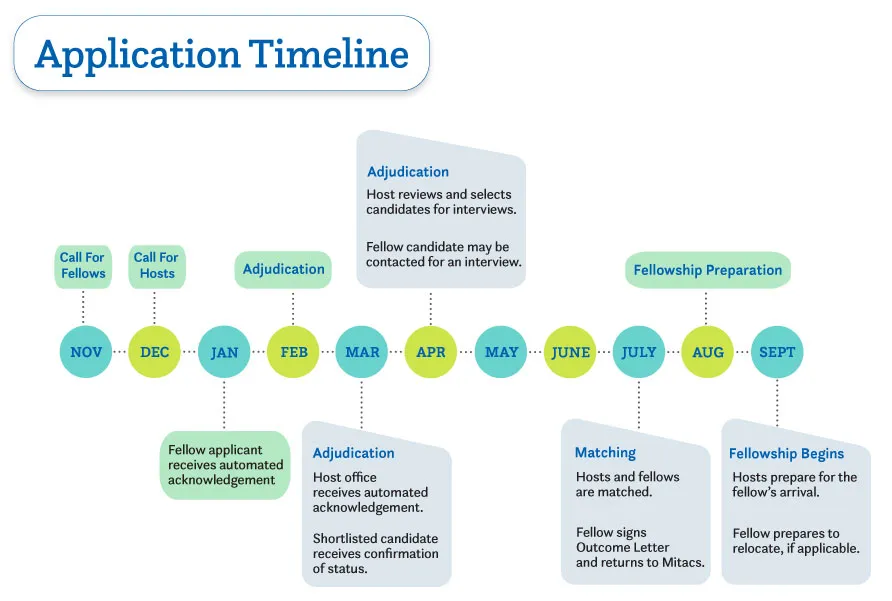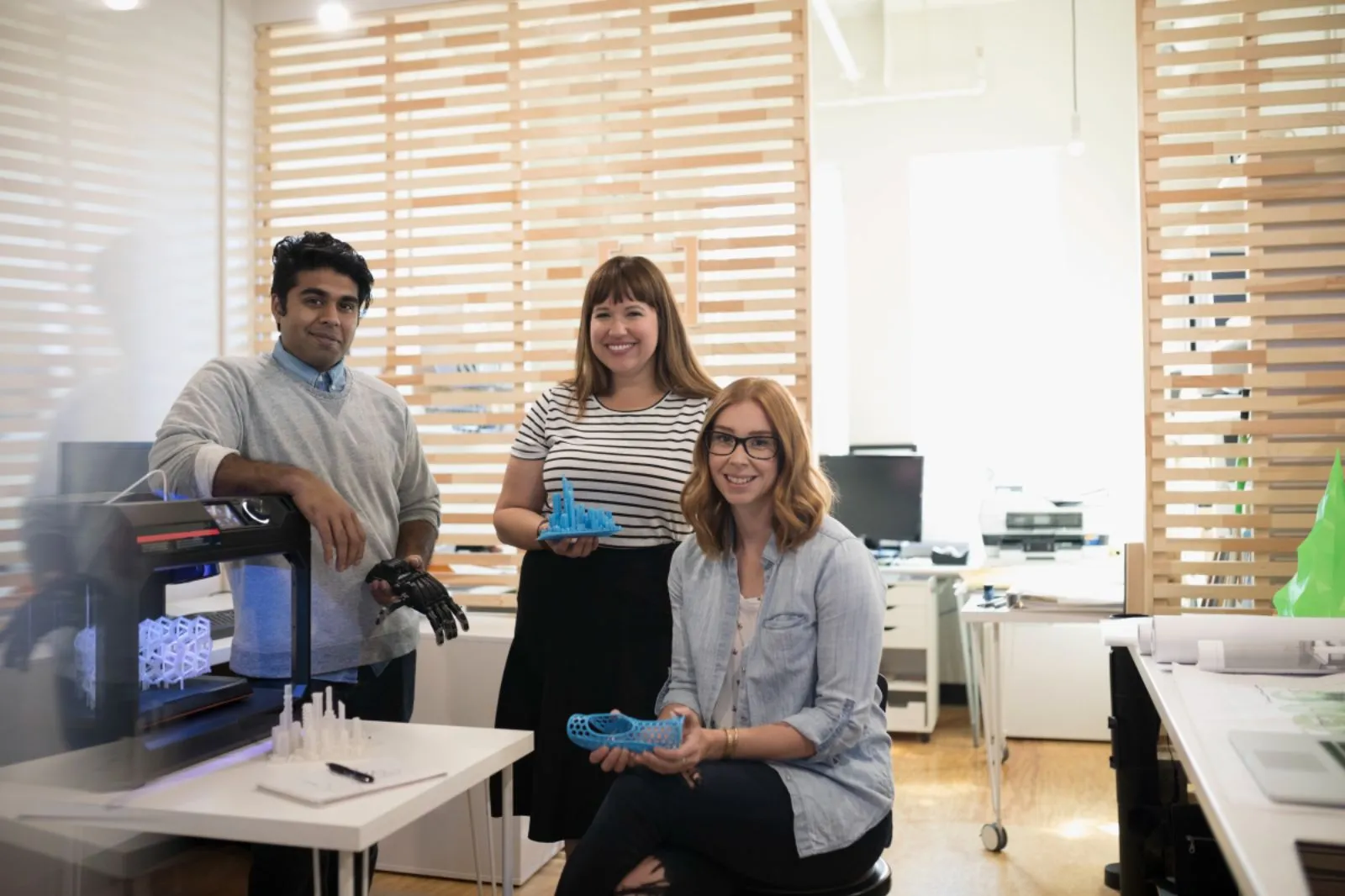The 2023-24 CSPF call is on hold until further notice.
ATTENTION: The Canadian Science Policy Fellowship program will not run in 2023-24.
To learn more about Mitacs programs and opportunities available for 2023-24, please visit this page.

October – March: Open call for host applications
- Prospective host offices submit their position descriptions to Mitacs
- All applicants will receive an automated email confirming receipt of their application
November – February: Open call for fellow applications
- Prospective fellows submit their applications and letters of reference to Mitacs
- All applicants will receive an automated email confirming receipt of their application
March – April: Adjudication
- All submitted applications are reviewed to ensure that prospective fellows and host positions meet the program eligibility criteria
- Applicants will be notified of their application status in April, once adjudication is complete
May: Interviewing
- Host offices review shortlist of semi-finalist applications and select fellows for interviews
- Mitacs will contact the selected fellows and share the host office position description in advance of the interview
- Hosts and fellows will set up a remote interview based on mutual availability. Travel costs for in-person interviews are not covered as they can be conducted remotely.
- Hosts and fellows complete ranking survey to submit preferences
June – July: Matching
- Mitacs confirms matches
- Fellows prepare to relocate, where applicable
- Hosts prepare an employment agreement with their HR department in accordance with the CSPF eligible position requirements
- Fellows negotiate and sign an employment agreement with their host office
August – September: Fellowships begin
- Fellowships begin; hosts and fellows attend CSPF Orientation and training program commences
If you have any questions about the Mitacs Canadian Science Policy Fellowship program, please email the Canadian Science Policy Fellowship team at policyfellowship@mitacs.ca.
Program Details
About the Program
The call for hosts is now closed.
The call for fellows is now closed.
The Mitacs Canadian Science Policy Fellowship places PhD holders in government host offices for a 12-month immersion into the policy-making process. Fellows apply their academic training, critical thinking, and analytical skills to support evidence-informed decision-making that addresses policy challenges within participating federal host offices. Hosts gain valuable science-based knowledge and build the professional skills of participating fellows.
We welcome application submissions from prospective fellows and hosts on an annual call cycle running from fall throughout winter.
The fellowship aims to:
- Create mutually beneficial relationships between government decision-makers and academic researchers in support of policy challenges in Canada
- Enhance science communication, collaboration, and capacity in support of evidence-informed policy-making
- Equip academic researchers with skills to address policy challenges while learning about government
- Contribute to a national network of science policy expertise across academia, government, not-for-profit organizations, and industry
By participating in the fellowship, fellows get the training and first-hand experience needed to address challenges of national public importance. Through the fellowship, fellows:
- Work full-time in a participating host office for 12 months (September-August) at an annual salary of $70,000-$80,000
- Attend professional development training and networking opportunities with their peers throughout the year
- Learn about policy-making in the public service through professional hands-on experience
- Apply their academic expertise and skills to public issues of concern
Host offices provide positions to fellows that support key policy challenges in their departments. By participating, hosts:
- Provide a range of policy tasks to their fellows, such as policy development, stakeholder engagement, and creating and maintaining key policy documents
- Grow their access to specialized expertise and the most up-to-date knowledge available in academia
- Increase the policy capacity within their department
- Support a growing body of researchers uniquely trained to address key policy challenges
Want to learn more about science policy? Refer to the Science Policy Briefing included in the downloadable General Mitacs Terms, Conditions & Policies zip file, found in the How To Apply section.
Curious about our past CSPF fellowships? Review our Look Book (included in the downloadable Application Package zip file, found in the How To Apply section) for examples of how participants have contributed to the Canadian science policy landscape.
You can also read about our past cohorts in our yearly news releases
If you have any questions about the Mitacs Canadian Science Policy Fellowship program, please email the Canadian Science Policy Fellowship team at policyfellowship@mitacs.ca.
Professional Development and Training
As part of the CSPF program, Mitacs provides professional development training for fellows throughout the year, as well as opportunities to network with stakeholders from the science policy community through invitations to conferences, events, and volunteering.
Fellowship training starts with Orientation at the outset of the cohort year, where fellows learn about a variety of topics, including:
- Science policy
- Science communication
- Government 101
- Media training
Throughout the year, fellows participate in mandatory instructor-led courses focusing on developing key science policy themes through their fellowships:
- Strengthening science communication
- Growing relationship-building skills with diverse stakeholders
Mitacs welcomes host offices to offer their fellows additional professional development training available to employees of their departments.
If you have any questions about the Mitacs Canadian Science Policy Fellowship program, please email the Canadian Science Policy Fellowship team at policyfellowship@mitacs.ca.
Eligibility
Eligible CSPF positions must:
- Offer a full-time 12-month fellowship to a PhD holder in a host office location
- Provide remuneration and employee benefits to the fellow in the range of $70,000-$80,000 through an employment contract
- Be a policy-focused position addressing a clearly defined challenge that requires the advanced competencies and skills of a PhD holder
- Demonstrate a clear reporting and mentoring structure for the fellow
- Outline the processes of the host office (accountability practices, mentorship, or other professional opportunities, etc.) that can support the success of the fellowship
NOTE: A sample host position is included in the downloadable Application Package zip file, found in the How To Apply section.
To be considered for a CSPF fellowship, eligible applicants must:
- Be a Canadian citizen or permanent resident
- Please note that Canadian citizenship or permanent resident status is required to obtain a security clearance with a host office to begin a fellowship. All applicants must have Canadian citizenship or permanent residency prior to the start of the interview process. The interview process starts in May of the year of the fellowship.
- Hold a PhD in any academic discipline at the start of the fellowship
- Be able to participate full-time in a 12-month fellowship at the host office
- Secure accommodation in the host city and relocate to their host office as needed
- Negotiate a leave of absence from their current employer, as applicable
- Meet any additional requirements of their hosts, including (but not limited to) security clearance requirements
Fellowships cannot be held concurrently with other Mitacs awards. If you are currently participating in a Mitacs program, whether as an intern, postdoctoral fellow, academic supervisor, or representative of an industrial partner, the award term end date must be no later than August 31 of the year in which the fellowship is due to start.
Please note: Mitacs does not currently offer renewals or second-year fellowships. Current and past fellows are not eligible to apply for a subsequent year of the program.
See our How to Apply section for more information on how to apply for a fellowship.
In addition to the requirements listed above, faculty applicants must also:
- Be a faculty member at a Canadian academic institution
- Faculty at Mitacs Honorary Partner universities must contact policyfellowship@mitacs.ca to determine eligibility
- Negotiate a leave of absence or sabbatical from the academic institution
If you have any questions about the Mitacs Canadian Science Policy Fellowship program, please email the Canadian Science Policy Fellowship team at policyfellowship@mitacs.ca.
How to Apply
We welcome application submissions from prospective fellows and hosts on an annual call cycle running from fall throughout winter.
Applications are received through a concurrent, double-blind process. Fellows apply to the Mitacs Canadian Science Policy Fellowship program, and host offices apply to host a fellow for the upcoming cohort year running from September to August.
Fellows and hosts must submit an application through an online form. All applicants will receive an automated email confirming receipt of their application submission.
The call for fellow applications is now closed!
Fellows
In order to be considered for the Mitacs Canadian Science Policy Fellowship program, you must submit a complete application through the online CSPF Fellow Application form by the deadline.
Completing your application package
A complete application includes the following:
- Submission of the online CSPF application form with all fields filled in and all required documents uploaded
- Two letters of reference (either uploaded, or emailed directly to policyfellowship@mitacs.ca)
Review the Guidelines for a Successful Fellow Application (found in the downloadable Application Package zip file) for a checklist and other helpful details to strengthen your application. Please note that the online application form does not allow you to save your work and come back to it. Please ensure your answers are fully developed before starting the form.
Language of application
You must submit your application in the language(s) required for positions within the host locations for which you wish to be considered*
- To be considered for a fellowship with the Government of Canada, you may submit a complete application using either the English or French fellow application webforms
NOTE: Mitacs does not guarantee that fellowships will be available in all host cities.
Letters of reference
Two letters of reference are required for an application to be considered complete:
- One letter should address the quality of your research work and experience
- The other letter should focus on your suitability for the program by highlighting your leadership experience, communication skills, and capacity to make connections between academic research and broader economic, social, or political issues
If your referees wish to submit their letters of support directly to Mitacs, they must email them to policyfellowship@mitacs.ca. If you choose this option, please ensure your referees are aware of the deadline above so that your application is complete and eligible for consideration.
Canadian Science Policy Fellowship (CSPF) downloads
All necessary CSPF and Mitacs forms, templates, terms, policies, etc., may be downloaded via the following zip files:
Program Administration
All submitted applications are reviewed to ensure that prospective fellows and host positions meet the program eligibility criteria.
Once fellow applications and host positions are adjudicated, all shortlisted semi-finalist applications will be presented to eligible host offices to select fellow candidates for interviewing. Following the interview period, selected fellows and host offices will rank their choices for Mitacs to facilitate fellowship matching. Please see the Matching section for more information on the matching process.
Fellow adjudication (March-April)
Fellow applications are adjudicated as part of a competitive call cycle through winter and spring in advance of the fellowship cohort start date in September.
All fellow applications are reviewed through a two-stage process:
1. Applications are reviewed for minimum eligibility requirements
Please refer to the Eligibility section for more information on fellow eligibility requirements
2. Fellow applications are then sent to a Fellow Adjudication Committee to shortlist candidates as semi-finalists
- The Fellow Adjudication Committee is made up of past Canadian Science Policy Fellows
- All applications are vetted for any potential conflict of interest with adjudication committee members
- Each application is reviewed by at least two separate members of the adjudication committee
- Adjudication committee members are asked to evaluate fellow applications based on research distinctions, leadership attributes, communication skills, and a commitment to the fellowship’s professional development opportunities and objectives
- Prospective fellows are evaluated using points-based criteria and review scores are calibrated to ensure consistent scoring is applied across members of the adjudication committee
- Based on the review scores of the adjudication committee, a shortlist of fellow applicants is presented to participating host offices to select candidates for interviewing
Host adjudication (March)
All host applications are reviewed by an internal Mitacs committee to ensure that prospective fellowship positions meet the program requirements. Applications are reviewed in accordance with the following adjudication criteria:
1. Is the focus of the policy position clear?
Are the policy issues, questions or challenges that the fellow will be working on clearly defined?
Does the position involve policy processes? (e.g., problem framing, policy formulation, decision-making, implementation, monitoring and evaluation)
Does the position include policy activities? (e.g., preparing briefing and speaking notes, senior decision-maker briefings, supporting the work of committees, stakeholder meetings, and/or consultations)
2. Is there a clear added value for the position?
- Are the fellow’s key responsibilities clearly defined?
- Is the work appropriate for someone at a PhD level?
- Is there an added value for the fellow in terms of skills development or exposure to government work?
3. Is there adequate support for the fellow to be successful in the position?
- Does the application reference mentoring or guidance throughout the fellowship, with a specific person in mind?
- Is there a clear accountability/reporting structure for the fellow in the application?
- Does the application reference any opportunities to engage in a wide range of internal and external activities, professional development, government training, etc.? If you have any questions about the Mitacs Canadian Science Policy Fellowship program, please email the Canadian Science Policy Fellowship team at policyfellowship@mitacs.ca.
The matching process begins with host-fellow interviews. Following adjudication, all shortlisted fellow applications will be presented to eligible host offices to select candidates for interviewing.
1. Selecting interview candidates
Eligible host offices will select candidates that they wish to interview by filtering through a list of shortlisted fellow applications.
Host offices may choose to narrow their selection of suitable candidates by filtering for (e.g.):
- Location
- Working ability of language(s) spoken
- Academic specialization
- Policy skills and competencies
Host offices will have access to the complete fellow application forms, and may wish to review the academic awards, past research experience, leadership experience, communication skills and statements of interest, among other fields, for potential candidates. Mitacs encourages hosts to be flexible on required expertise, as the success of fellowships is less dependent on academic discipline and more on broader skills that can be applied in the public service environment.
2. Interviewing (May-June)
Host offices are invited to request an interview with the shortlisted fellows they have selected. There are no restrictions on how many interviews a host office can request, however, we recommend selecting a minimum of three (3) candidates, where possible, to maximize potential matches.
Mitacs will contact the shortlisted fellows and share the host office position description in advance of the interview
Hosts and fellows will set up an interview at mutual availability. Hosts must be prepared to accommodate virtual interviews for fellows that may be outside of the host office city. Hosts and potential fellows should note that there are no funds available from Mitacs to accommodate travel for in-person interviews.
The interview is an opportunity for each party to learn more about the other. Host offices are encouraged to use their established HR processes for the interviews. It is important for hosts to accommodate questions from fellow applicants, as this is the fellow’s opportunity to evaluate the host office and fit from their perspective.
Fellow applicants should treat the interview process as they would any professional interview. We suggest that fellows discuss how their expertise relates to the policy area of the host and to science policy in general and prepare any questions they may have about the role. As each host department has their own HR processes, the interview process will vary from host to host.
3. Matching
Following the interview period, selected fellows and host offices will confidentially rank their choices for Mitacs to facilitate fellowship matches. We encourage all participants to provide as many rankings as possible to maximize potential matches.
Once all fellow and host rankings are submitted, Mitacs will facilitate matches to maximize the number of fellowship opportunities and to generate top-ranking matches, where possible. Please note that fellows and hosts may not be matched with their first choice.
We will attempt to match all semi-finalists to host offices. Should any host offices not find a match in the first round, the process allows for a second round of matching. Unmatched semi-finalists will be given the remaining host office position descriptions and will have the opportunity to write a 500-word “pitch” describing why they would be a good match for the host office. After reviewing the pitches, hosts can decide if they’d like to interview additional candidates.
In order to maintain the confidentiality of the ranking process, fellows and host offices should not discuss their ranking decisions.
If you have any questions about the Mitacs Canadian Science Policy Fellowship program, please email the Canadian Science Policy Fellowship team at policyfellowship@mitacs.ca.


